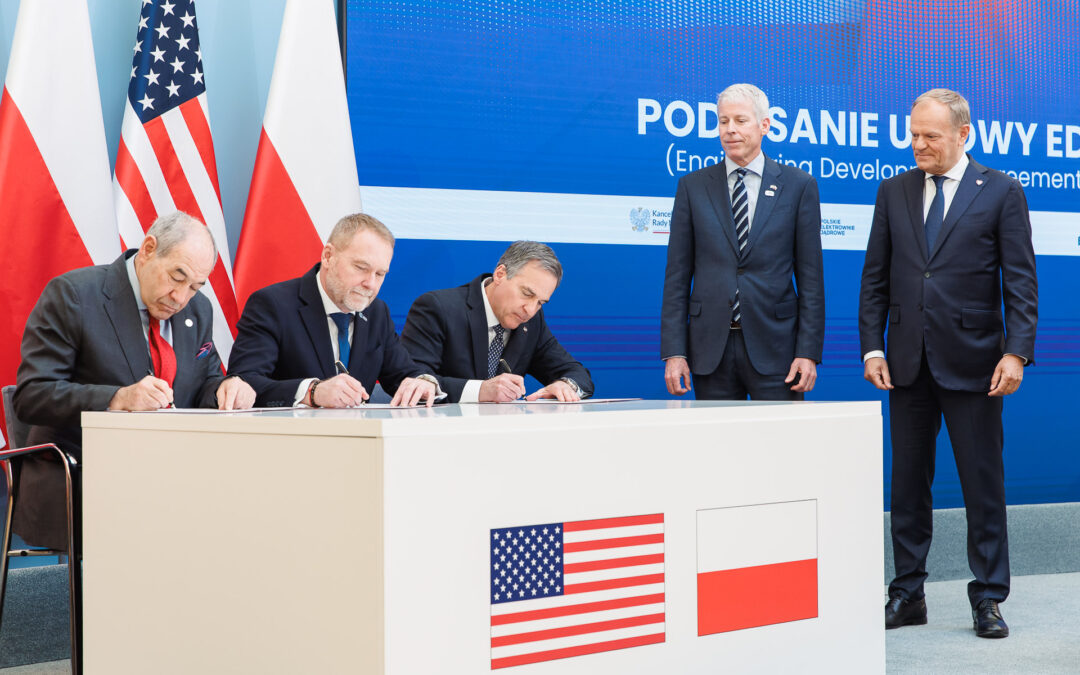Keep our news free from ads and paywalls by making a donation to support our work!

Notes from Poland is run by a small editorial team and is published by an independent, non-profit foundation that is funded through donations from our readers. We cannot do what we do without your support.
The Polish state firm developing the country’s first nuclear power station has signed an agreement with a consortium of US companies Westinghouse and Bechtel to continue cooperation on the 192 billion zloty ($51 billion) project.
“I am pleased to report that our cooperation with the United States in the field of energy has gained momentum,” declared Polish Prime Minister Donald Tusk, who attended the signing ceremony alongside US energy secretary Chris Wright.
💬 Premier @donaldtusk w #KPRM: Rozmawiałem dziś z Sekretarzem ds. Energii USA, Chrisem Wrightem @SecretaryWright, o współpracy Polski i Stanów Zjednoczonych w zakresie energetyki. Z dużą satysfakcją mogę poinformować, że nasza współpraca nabrała nowego impetu. pic.twitter.com/ISh5tyXFgr
— Kancelaria Premiera (@PremierRP) April 28, 2025
Tusk said that the new agreement with Westinghouse-Bechtel, who were first chosen as partners under the previous Polish government in 2022, “is better from the point of view of Polish interests”, helping ensure that “the investment is equally profitable for both parties”. The terms of the deal have not yet been made public.
“Polish-American cooperation in the field of nuclear energy is doing better than ever before, and we will not stop at this one investment,” added the prime minister, who revealed he and Wright had also discussed the development of small modular reactors (SMRs) and Polish imports of US liquefied natural gas (LNG).
“This will be a truly joint venture,” said Wright, quoted by news website Interia. “[It] will not only consist of building a large nuclear power plant…but, I believe, will be the beginning of long-term cooperation between Poland and the US in the field of nuclear energy.”
This is a final appeal for our emergency campaign to save Notes from Poland.
Next week, we may lose the major grant that sustains our work.
If you value the service we provide, please click below and make a donation to help it continue https://t.co/0gVkMlaA0W
— Notes from Poland 🇵🇱 (@notesfrompoland) April 22, 2025
The previous contract with the US consortium expired at the end of March. However, in early April, Tusk announced that the terms of a new agreement had already been negotiated and would shortly be formalised.
The new deal, called an engineering development agreement (EDA), “clarifies provisions that guarantee effective yet legally compliant cooperation with the Westinghouse-Bechtel consortium for nine months”, announced Polskie Elektrownie Jądrowe (PEJ), the Polish state firm tasked with building the plant, today.
It will ensure the continuation of engineering work relating to the project, which has so far included geological drilling by Bechtel at the location that has been selected for the nuclear plant on Poland’s northern Baltic Sea coast.
A bill providing 60bn zloty (€14.4bn) in financing for Poland’s first nuclear power plant, which is being developed with US firm Westinghouse, has been signed into law
Warsaw is still awaiting EU approval for the state aid it wants to give to the project https://t.co/DAd8X5UITA
— Notes from Poland 🇵🇱 (@notesfrompoland) March 26, 2025
“The agreement signed today is a platform for further cooperation and an example of mutually beneficial compromise…[that] maintains the highest technological and safety standards while ensuring reasonable costs and responsible risk and schedule management,” said PEJ’s acting president, Piotr Piela.
“I am convinced that together with our American partners we are consistently moving closer to concluding a final agreement for the construction of this power plant,” he added.
“This project will not only provide Poland with one of the reliable, basic sources of clean energy at an affordable price, but will also bring billions of zlotys in investments and creat[e] thousands of jobs during the construction and many decades of operation of the plant,” added Dan Lipman, president of Westinghouse Energy Systems.
Poland’s climate ministry has outlined plans for the country to generate three quarters of its electricity from zero-emissions sources by 2040, with 51% coming from renewables and almost 23% from nuclear https://t.co/CksVqGQXkV
— Notes from Poland 🇵🇱 (@notesfrompoland) April 4, 2023
Last month, President Andrzej Duda signed into law a government bill that will provide 60 billion zloty (€15.9 billion) in financing for construction of the first nuclear plant.
That will cover around 30% of the project’s total estimated costs, with the remainder coming from foreign borrowing. However, Poland is still awaiting European Union approval for the state aid it wants to provide to the project.
According to current plans, construction is scheduled to start in 2028, with the first of three reactors going online in 2036. By the start of 2039, the plant is expected to be fully operational.
Under the government’s Polish Nuclear Power Programme, as well as the plant on the Baltic coast, there will also be a second nuclear power station at an as-yet-undecided location elsewhere in Poland. The total combined capacity of the two plants will be between 6 and 9 GW.
Japan and Poland have signed an agreement on developing nuclear energy.
Poland, which is planning to build its first nuclear power stations, hopes the cooperation will allow it to draw on Japan’s experience to “build nuclear skills and competences” https://t.co/oIHQXfV1Yj
— Notes from Poland 🇵🇱 (@notesfrompoland) November 7, 2024

Notes from Poland is run by a small editorial team and published by an independent, non-profit foundation that is funded through donations from our readers. We cannot do what we do without your support.
Main image credit: KPRM/Flickr (under CC BY-NC-ND 2.0)

Daniel Tilles is editor-in-chief of Notes from Poland. He has written on Polish affairs for a wide range of publications, including Foreign Policy, POLITICO Europe, EUobserver and Dziennik Gazeta Prawna.



















